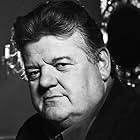Caravaggio
- 1986
- 1h 33m
IMDb RATING
6.5/10
7.2K
YOUR RATING
A retelling of the life of the celebrated 17th-century painter through his brilliant, nearly blasphemous paintings and his flirtations with the underworld.A retelling of the life of the celebrated 17th-century painter through his brilliant, nearly blasphemous paintings and his flirtations with the underworld.A retelling of the life of the celebrated 17th-century painter through his brilliant, nearly blasphemous paintings and his flirtations with the underworld.
- Awards
- 3 wins & 3 nominations
- Director
- Writers
- All cast & crew
- Production, box office & more at IMDbPro
Storyline
Did you know
- TriviaTilda Swinton's debut.
- GoofsA typewriter is used, a saxophone is played, a train and steamship hooter are heard. In addition one of the characters plays with a (very advanced for the time of the movie) credit card-sized calculator with beeping buttons. These items are included deliberately as a stylistic decision of the filmmakers, not "goofs" of people unaware of the absence of these items in the 1500s and 1600s.
- Quotes
Caravaggio: [after being stabbed by Ranuccio Caravaggio touches the wound and blood] Blood brothers!
[Ranucchio kisses him]
- Crazy creditsThe end credits scroll down the screen (top-to-bottom).
- ConnectionsFeatured in Arena: Derek Jarman - A Portrait (1991)
- SoundtracksMISSA LUX ET ORGIO
By kind permission of Casa Musicale Eco (Milan)
Featured review
I tend to define myself as an artist and I consider my mind broad enough to welcome any artistic license coming from a director whom I also consider an artist... but when a historical biopic supposedly tells you the story of an artist of the caliber of Michelangelo Merisi da Caravaggio and by some burst of inspiration, the director Derek Jarman decides to insert anachronistic details that go from people wearing suits, tuxedos or sights as incongruous as a bike or a typewriter... I can help but feel a certain resistance to whatever should appeal to me at that moment. To put it simply, that turned me off.
We're speaking of a few random scenes that didn't affect the story in a way or another, and their needlessness made me even angrier... I know there's a way to interpret everything, maybe some iconoclastic approach to a man who himself was a revolutionary painter and initiator of the Baroque school, with its high contrast of lights and dark shadows and very expressive style, maybe it was Jarman's ambition to pay tribute to the painter and the project took him so long and underwent so many incidents he didn't care for realism, using the 'Italy of his memory' according to his photographer, but there are so many magnificent shots in the film that recreate the texture of the latest years of the Renaissance and even the color of the initial painting that my mind kept wondering Why? What was the purpose to all that?
Now, I've said it... and having said that, I can say that I enjoyed the look of the film and its recreation of some of Caravaggio's paintings, not that I could recall them all, in fact, I'm not familiar with his work but that didn't matter at all, any scene could have been painting material and last films to made me feel that were "Barry Lyndon" and "Cries and Whispers" (with its long contemplative monologues told in voice-over, the film did have a Bergmanian quality of its own). The use of contrast, the dust and even the dirt looked somewhat appealing creating a sort of shadowy texture that enriched the skin complexion, it's a marvel of recreation and the first twenty minutes had me literally hooked. The part with Dexter Fletcher playing young Caravaggio (the one who impersonated Bacchus in a famous painting) with the ambiguous strange relationship going with a Cardinal (Michael Gough) was my favorite.
The second part is more of a ptachwrok of scenes where it's difficult to keep a certain feeling of continuity but we get the attraction between the painter (now older, played by Nigel Terry) and two models (Sean Bean who's way too good looking not to be distracting ) and Tilda Swinton. The scenes works so well visually but the narration keeps us in the shadow, and maybe it betrays the fact that Jarman was so immersed in his character that he only left us a few breeches to wriggle through, as a character study, I didn't find the passionate artist or whatever wood made the fire of his creativity burn, the passion was there but it was diluted in that feeling of detachment, of randomness that made it very hard to follow... it's hard to make movies about painters, to understand their painting, you've got to see their vision, to hear their mind and I guess I simply couldn't connect myself and my mind was stubbornly sticking to these iconoclasts details that they gave me the feeling tat Jackman didn't care for authenticity, only for mood.
In my prime as a movie watcher, I would have given the film another 'chance' (or myself) but I don't think I would get it any better, anyway, it is a good film but looks more like an art-house for which the word 'pretentious' was invented, a picture meant for students, rather than a biopic for the average watcher. I didn't like the film for several reasons and perhaps the most vivid one is that it makes me feel like a conventional schmuck who can't enjoy art or understand it. I wouldn't call it pretentious but there's something rather vain in the way one appropriate himself a character and twists his life like that, even for the sake of art. Or maybe to use a hackneyed version, I didn't get it and now, I'm among the users who rated the film low enough to earn it a rating above 7...
We're speaking of a few random scenes that didn't affect the story in a way or another, and their needlessness made me even angrier... I know there's a way to interpret everything, maybe some iconoclastic approach to a man who himself was a revolutionary painter and initiator of the Baroque school, with its high contrast of lights and dark shadows and very expressive style, maybe it was Jarman's ambition to pay tribute to the painter and the project took him so long and underwent so many incidents he didn't care for realism, using the 'Italy of his memory' according to his photographer, but there are so many magnificent shots in the film that recreate the texture of the latest years of the Renaissance and even the color of the initial painting that my mind kept wondering Why? What was the purpose to all that?
Now, I've said it... and having said that, I can say that I enjoyed the look of the film and its recreation of some of Caravaggio's paintings, not that I could recall them all, in fact, I'm not familiar with his work but that didn't matter at all, any scene could have been painting material and last films to made me feel that were "Barry Lyndon" and "Cries and Whispers" (with its long contemplative monologues told in voice-over, the film did have a Bergmanian quality of its own). The use of contrast, the dust and even the dirt looked somewhat appealing creating a sort of shadowy texture that enriched the skin complexion, it's a marvel of recreation and the first twenty minutes had me literally hooked. The part with Dexter Fletcher playing young Caravaggio (the one who impersonated Bacchus in a famous painting) with the ambiguous strange relationship going with a Cardinal (Michael Gough) was my favorite.
The second part is more of a ptachwrok of scenes where it's difficult to keep a certain feeling of continuity but we get the attraction between the painter (now older, played by Nigel Terry) and two models (Sean Bean who's way too good looking not to be distracting ) and Tilda Swinton. The scenes works so well visually but the narration keeps us in the shadow, and maybe it betrays the fact that Jarman was so immersed in his character that he only left us a few breeches to wriggle through, as a character study, I didn't find the passionate artist or whatever wood made the fire of his creativity burn, the passion was there but it was diluted in that feeling of detachment, of randomness that made it very hard to follow... it's hard to make movies about painters, to understand their painting, you've got to see their vision, to hear their mind and I guess I simply couldn't connect myself and my mind was stubbornly sticking to these iconoclasts details that they gave me the feeling tat Jackman didn't care for authenticity, only for mood.
In my prime as a movie watcher, I would have given the film another 'chance' (or myself) but I don't think I would get it any better, anyway, it is a good film but looks more like an art-house for which the word 'pretentious' was invented, a picture meant for students, rather than a biopic for the average watcher. I didn't like the film for several reasons and perhaps the most vivid one is that it makes me feel like a conventional schmuck who can't enjoy art or understand it. I wouldn't call it pretentious but there's something rather vain in the way one appropriate himself a character and twists his life like that, even for the sake of art. Or maybe to use a hackneyed version, I didn't get it and now, I'm among the users who rated the film low enough to earn it a rating above 7...
- ElMaruecan82
- Oct 29, 2021
- Permalink
- How long is Caravaggio?Powered by Alexa
Details
- Release date
- Country of origin
- Official site
- Languages
- Also known as
- Караваджо
- Filming locations
- Production companies
- See more company credits at IMDbPro
Box office
- Budget
- £450,000 (estimated)
- Gross US & Canada
- $3,774
- Opening weekend US & Canada
- $532
- Apr 21, 2002
- Gross worldwide
- $5,478
- Runtime1 hour 33 minutes
- Sound mix
- Aspect ratio
- 1.85 : 1
Contribute to this page
Suggest an edit or add missing content

































